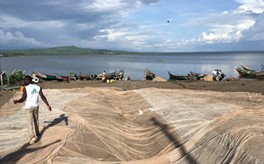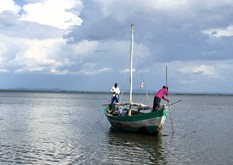Commissioned by the Deutsche Gesellschaft für Internationale Zusammenarbeit (GIZ), our energy experts are once again actively involved in Africa’s green future: They are developing an action plan for the use of Power-to-X technology in Kenya by analyzing the technical and commercial potential of innovative hydrogen technology in the country.
Adding hydrogen to Kenya's renewable energy supply
Kenya already uses renewable energies in a variety of ways and generates more than 90 percent of its electricity from hydropower, geothermal energy, solar and wind energy as well as biomass. Our engineers are assessing these and other environmental, social and economic benefits and examining what actions need to be taken to use hydrogen to further advance technological change on a larger scale. In this study, they are giving particular consideration to water and geothermal energy as sources for generating renewable electricity and heat.
Tractebel brings extensive global hydrogen expertise
Tractebel is already working on two similar hydrogen projects in Algeria and Brazil. From its experience with numerous projects in the Kenyan electricity sector, the team is familiar with the situation on the ground and has close contacts with the stakeholders.
Our specialists bring all the expertise and market knowledge of the Tractebel Group in the field of hydrogen technologies. They are supported by the know-how of our long-standing local partner Gamma Systems and the pan-African consultancy EED Advisory. This partnership combines in-depth technological expertise with regional knowledge and ensures effective project work with lean structures.
Innovative Power-to-X technology
Power-to-X technology, which is suitable for Kenya, is based on green hydrogen and the ammonia derived from it to reduce the consumption of fossil fuels in favour of sustainable energy. The hydrogen is mainly produced by electrolysis and the gas is transported by truck, rail and pipelines. Where larger distances - for example, by sea - need to be covered, ammonia offers a less volatile source of energy with a higher density than hydrogen.
Our engineers are examining the potential of this technology for both domestic use in Kenya and options for export. In this study they are considering the technical, ecological, social and infrastructure aspects and providing cost estimates (Least Cost of Green Hydrogen and Ammonia: LCoH and LCoA). Also included in the analyses are the requisite political and regulatory pre-conditions, in the form of a PESTEL analysis (Political, Economic, Social, Technical, Environmental, Legal forces).
The team started the project in May 2021, and will be presenting the results as part of a stakeholder workshop in October 2021.
| “The project contributes to sustainable development, which can also have an impact beyond the country’s borders. In this respect Kenya is a pilot country for East Africa, based on its advanced level of educational and economic development and its strategic location in the region,” says Project Manager Karsten Schmitt. |
 |
 |
Project Director Dr. Stefan Drenkard adds: “Green hydrogen could enable Kenya to replace the use of fossil fuels, reduce dependence on fossil fuel imports and create a new sector in the economy which keeps larger portions of the value creation chain in the country, leading to the generation of domestic jobs and economic growth. The reduction of greenhouse gases associated with the use of green hydrogen benefits the entire world.”
|


With its large bodies of water such as Lake Victoria, Kenya is rich in water resources.








